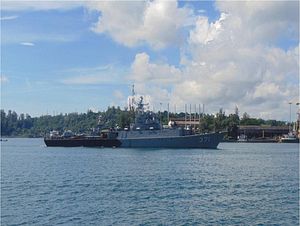This week, Indian media outlets reported that India and Indonesia are looking to deepen their defense ties following Indian Defense Secretary G. Mohan Kumar’s visit to Jakarta in mid-January.
Indian newspapers cited anonymous defense sources as saying that various moves were agreed to during Kumar’s trip, including expanding military exercises, boosting defense industry collaboration, and deepening maritime cooperation, which includes submarine training for Indonesia.
Despite the usual sensationalism that accompanied the reports, the drive to expand India-Indonesia defense relations is far from new. Defense ties have been a focus as the two large democracies have been advancing their overall ties, which were upgraded to a strategic partnership back in 2005. That brought modest gains in some functional areas, be it disaster management or maritime security or counterterrorism.
More recently, the attempts to upgrade defense ties have gained even more momentum. Following Indonesian President Joko “Jokowi” Widodo’s trip to India last December, both sides committed to strengthening the architecture of their defense relationship by holding regular sessions of their defense ministers dialogue and the joint defense cooperation committee. They also said they would look to upgrade the 2001 Agreement on Cooperative Activities in the Fields of Defense to a more substantive bilateral defense cooperation agreement, indicating that inroads would be made in certain areas.
It is little surprise, then, that we are seeing more noise around what the contours of a deeper defense relationship would look like. All the general areas that have been reported – exercises, training and exchanges, and defense industry cooperation – are ones that countries would logically consider when expanding any military relationship.
Some of them also follow in the pattern of what India already has with Indonesia. Maritime security has been a key focus for the leaders of both countries in addition to its clear strategic logic for the two Indian Ocean littoral neighbors, so close observers of the relationship had already expected that to gain steam.
Similarly, expanding exercises would not be a heavy lift since there are already a range of drills the two sides have, including the army exercise Garuda Shakti which has now undergone four iterations, or, on the navy side, the India-Indonesia Bilateral Maritime Exercise, first held in October 2015.
In other areas, talking about boosting defense cooperation is also quite apart from acting on it. Take defense industry collaboration, for example. There have already been conversations around potential opportunities, be it technology transfers, purchases of certain maritime equipment, or expanding commercial agreements between shipbuilders or cooperation in military aerospace programs. But it has proven to be a much heavier lift in practice thus far. Seasoned observers know that this gap between rhetoric and reality is true not just of India-Indonesia defense ties, but the relationship more generally as well as ASEAN-India relations as a whole.
Furthermore, some of the comparisons we have seen made between New Delhi’s ties with Indonesia and other Southeast Asian states like Singapore or Vietnam are a bit too much of a stretch. The defense relationship between India and Singapore is much more mature than those with most other ASEAN states, so the complexity of the exercises puts them at a different level, relatively speaking. As for Vietnam, the training aspect of the defense relationship is much further along than it is for Indonesia, despite the fact that there was a deal struck between the two sides back in 2013 for training and support for the Indonesian Air Force’s Sukhoi fighter jets and pilots.
So while we are likely to see some gains in the India-Indonesia defense relationship in the coming years, one should also keep things in perspective whenever one hears talk of a “deepening.”
































